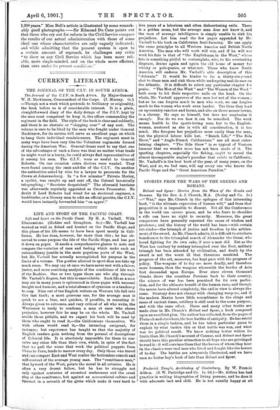• LIFE AND SPORT ON THE PACIFIC COAST.
Life and Sport on the Pacific Coast. By H. A. VachelL With Illustrations. (Hodder and Stoughton. 6s.)—Mr. Vachell has worked as well as fished and hunted on the Pacific Slope, and this phase of his life seems to have been spent mostly in Cali- fornia. He has done, however, far more than this ; he has ob- served to some purpose the life of the Pacific Slope, and has put it down on paper. It needs a comprehensive glance to note and compare the varieties of race and feeling which make such an extraordinary jumble in the more populous parts of the West, but Mr. Vachell has actually accomplished his purpose in the limits of a volume. The portion allotted to sport does not take up much room. We may say at once we have never met with a fairer, juster, and more searching analysis of the conditions of life west of the Rockies. One or two types there are who slip through Mr. Vachell's fingers, but this is unavoidable. Such life as a man may see in malty years is epitomised in these pages with unusual insight and humour, and a total absence of cynicism or a tendency to carp. Nine out of ten English writers on Western life fall into this last fault; a most grievous one, for the average man is quick to see a bias, and quicker, if possible, in resenting it' Always given to extremes, and very critical of all who write, the Westerner is ready to condemn a man at once who shows prejudice, however fair he may be on the whole. Mr. Vachell avoids these pitfalls, and we expect his book will be read by those who ought to read it,—the Californians themselves. We wish others would read it,—the intending emigrant, for instance; but experience has taught us that the majority of English readers gain nothing from the perusal of descriptions of Colonial life. It is absolutely impossible for them to con- ceive any other life than their own, which, in spite of the fact that v. e pull the wires that work the political puppets from China to Peru, tends to narrow every day. Only those who travel and can compare East and West realise the bottomless conceit and self-content of the average young man. The "remittance man," that byword of the West, points the moral in all colonies. He is often a very decent fellow, but he has to struggle not only against centuries of ancestral uselessness and the cruel clog of the remittance, but against an accumulated culture and Interest in a seventh of • the globe which make it very hard to live years of a laborious and often disheartening exile. There is a golden mean, but the average man does not know it, and the man of average intelligence is simply unable to sink his prejudices. Let him read the few pages appended by Mr: Vachell to his book on Californian fruit-farming. He can apply. the same principles to all Western America and British North America. The man who will work will win, and if he will not work his fate is. that of "the Englishman in the West," whose fate is something pitiful to contemplate, who, to his everlasting disgrace, drains again and again the old home of money for whisky or polo-ponies, or what-not. Those who know North America will endorse Mr. Vachell's able description of this "Johnnie." It would be kinder to tie a thirty-six-pound shot to these men and sink them while undergoing mal-de-mer on the Atlantic. It is difficult to select any particular chapter for praise. " The Men of. the West" and" The Women of the West" both seem• to hit their respective nails on the head. On the whole, Mr. Vachell approves of the men but not of the women ; but as he can forgive much to men who work, we can forgive much to the women who work even harder. The lives they lead on up-country ranches and farms, and also on those nearer towns; is a slavery. He says so himself, but does not emphasise it enough. Nor do we see how it can be remedied. The work means health to the sports-loving man, but to the. English- woman, nurtured as she is with all consideration, it is too much. She foregoes her prejudices more easily than the man, but the physical labour kills her. "Ranch Life," "The Side Show," and "Anglo-French Californians" are all most enter- taining chapters. "The Side Show" is so typical of Western humour that we wonder more has not been made of it. The sporting chapters, especially the fishing, ought to reveal the almost incomparable angler's paradise that exists in California. Mr. Vachell's is the best book of the year, of many years, on the West, and so, we feel sure, will say every one who knows the Pacific Slope and the "Great American Paradise."






































 Previous page
Previous page